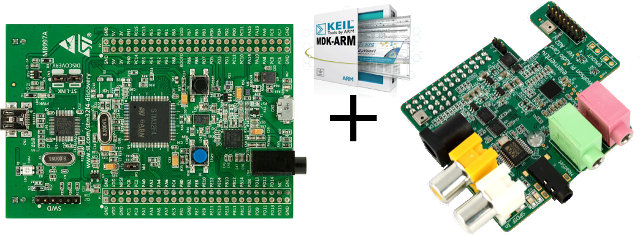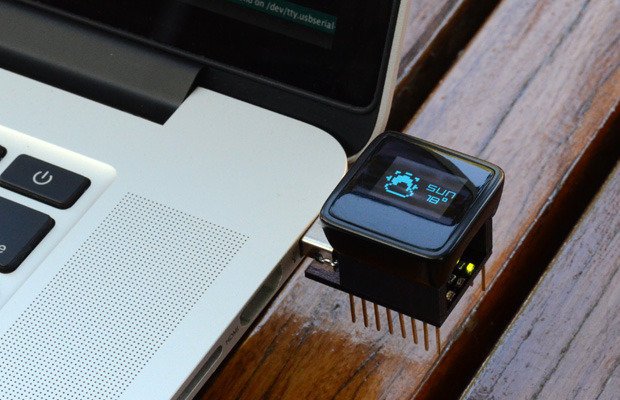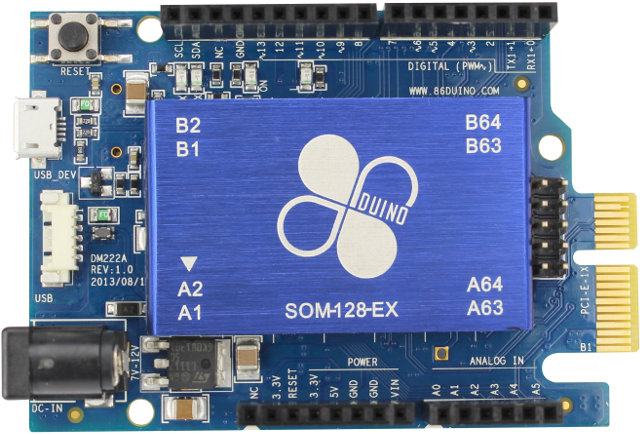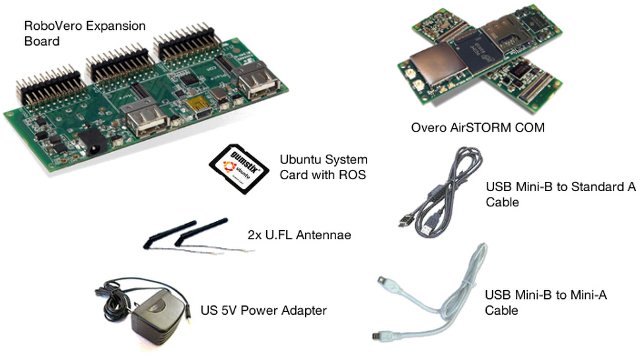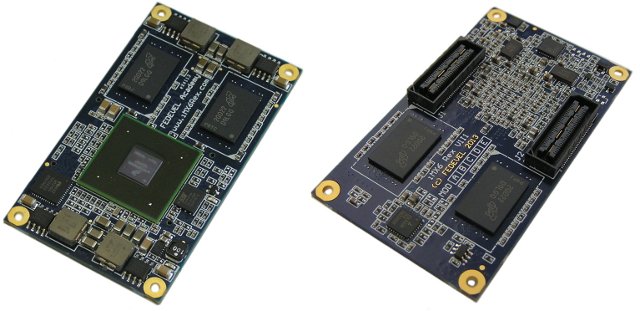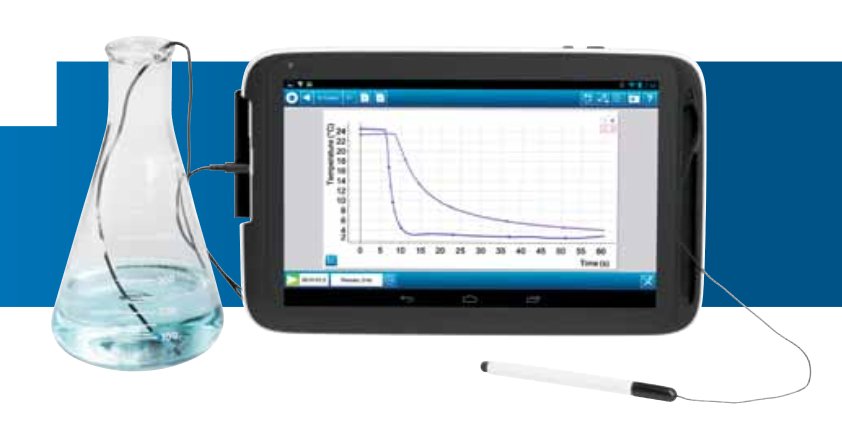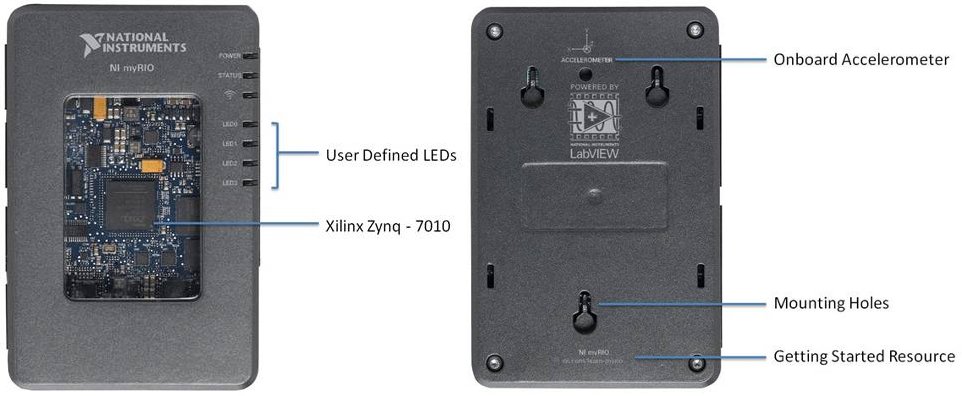DSP (Digital Signal Processing) courses at University have traditionally used software simulation packages (Matlab), or hands-on labs using development kits costing around $300 per student. In order to reduce costs, ARM University program and their corporate partners have launched a DSP ‘Lab-in-a-Box’ so that university students can learn DSP and audio systems with hardware selling for about $50, or over 80% cheaper than previous educational hardware. A typical DSP Lab-in-a-Box (LiB) would come with: STMicroelectronics ARM Cortex-M4-based STM32F4 Discovery MCU board Wolfson Microelectronics and Farnell element14 Wolfson Audio Card. ARM Keil MDK-Professional development tool with a 1-year renewable software license. Teaching materials such as lecture slides, code samples, and hands-on lab manuals. STM32F4-Discovery board features an STM32F407VGT6 MCU (ARM Cortex-M4F core) with 1 MB Flash, and 192 KB RAM, sensors (motion and accelerometer), a digital microphone, and audio DAC, a micro USB connector, and various buttons and LEDs. The Wolfson […]
MicroView is a Tiny Arduino Compatible Board with an OLED Display (Crowdfunding)
Last year, we’ve been presented with many small Arduino compatible boards such as MicroDuino, RFDuino, BLEDuino, Spark Core, Olimexino-Nano and more… All these boards have been own strength and connectivity options, but if you want to see what going on in your board, you’d either need to connect it to your computer, or connect some LEDs or an external display. Geek Ammo’s MicroView fixes that by providing an Arduino compatible board nicely combined with a built-in OLED display. This allows you to display stats, weather, play games, create wearable projects (watch, necklace), and all sort of other projects that may require a small display. MicroView specifications: MCU – Atmel ATmega328P @ 16 MHz with 32KB flash, 2 KB SRAM, and 1KB EEPROM Display – 64×48 OLED Display Digital I/O – 12 (of which 3 provide PWM output) Analog Input – 6 Operating Voltage: 5V Input Voltage: 3.3VDC to 16VDC, no […]
$39 86Duino ZERO is an x86 Arduino Compatible Board that Supports DOS, Windows, and Linux
Intel Gallileo Development Board with a Intel Quark processor, and Arduino software and hardware, now gets some competition with DM&P Electronics’ 86Duino ZERO board powered by the company’s Vortex86EX processor and 128MB RAM, that is said to support DOS, Windows, and Linux. 86Duino ZERO Specifications: Processor – DM&P Vortex86EX 32-bit x86 processor @ 300MHz System Memory – 128MB DDR3 Storage – 8MB SPI flash, and microSD card slot Connectivity – 10/100M Ethernet (at the back of the board, not RJ45) USB – USB host connector, micro USB port for development Arduino Leonardo compatible headers Misc – Reset button, PCIE bus Power Supply – DC-IN 7 to 12V, or via microUSB port. The board is comprised of a daughter board (DM-222) and a System-on-Module (SoM) either called DM-205 and or Vortex86EX SOM-128-EX which the following specs (some of which are not accessible in 86Duino Zero): Processor – Vortex86EX @ 300MHz System […]
Gumstix Announces Solution Kits for their CPU Modules and Boards
Gumstix has recently unveiled several solution kits featuring their Overo and DuoVero Computer-on-Modules (CoMs), Pepper single board computer, and several expansions boards, together with required accessories, and software packages, in order to help their customers getting started more easily. All these solutions are based on Texas Instruments OMAP3, OMAP4, and/or Sitara processors, and run Linux (Ubuntu or Yocto), and sometimes Android for the kits with displays. The solutions kits target 6 different types of applications and/or markets: Robotics Robotic Development Kit (Pictured above) with one Overo AirSTORM CoM (OMAP3703), and RoboVero expansion board. The kit is better suited for motor control applications. Mobile Robotic Development Kit with one Overo AirSTORM CoM, and Turtlecore expansion board to be used with iRobot Create. The kits ship with a Linaro (Ubuntu for Overo) system card and Robot Operating System (ROS) pre-installed. Handhelds 3.5″ Handheld Development Kit featuring Overo AirSTORM CoM with Alto35 cutomizable […]
iMX6 Rex Open Source Hardware SoM and Baseboard Designed to Teach Schematic and PCB Layout Design
Voipac, a Slovakian manufacturing company, has recently unveiled iMX6 Rex module and iMX6 Rex development baseboard, which have mainly been developed in order to support FEDEVEL Academy Schematic Design and Advanced PCB Layout courses, but can also be used for other purposes. The module is powered by Freescale i.MX6 Dual (Solo and Quad also available on request), and comes with 512MB RAM (upgradeable to 4GB), and up to 32MB SPI flash. The complete hardware will be released under an open source hardware license, but with some caveats as I’ll explain later. iMX6 Rex module specifications (basic configuration): SoC – Freescale iMX6 processor up to 1.2GHz / 2 cores (1 and 4 cores also available) System Memory – 512MB DDR3-1066 (533MHz), up to 4GB Storage – 2MB On board SPI Flash, up to 32MB 10/100/1000 Mbps Ethernet PHY 2 high speed board to board connectors (only one required) with signals for HDMI, […]
Terasic’s Altera DE1-SoC Board Based on Cyclone V Dual Cortex A9 + FPGA SoC Sells for $150 Up
A few months ago, Terasic unveiled its SoCKit powered by Altera Cyclone V dual Cortex A9 + FPGA. They’ve now announced a cheaper version will a less powerful Cyclone V SoC and lower specs (e.g. less RAM, only one sensor, etc…) that sells for as low as $150 for educational or academic purposes, and $199 for the rest of us. Altera DE1-SoC Board specifications: FPGA Device Cyclone V SoC 5CSEMA5F31 Device Dual-core ARM Cortex-A9 (HPS – Hard Processor System) 85K Programmable Logic Elements 4,450 Kbits embedded memory 6 Fractional PLLs 2 Hard Memory Controllers Configuration and Debug Quad Serial Configuration device – EPCQ256 on FPGA (EPCQ = Erasable Programmable Configurable Quad-SPI device) On-Board USB Blaster II (Normal type B USB connector) Memory Device 64MB (32Mx16) SDRAM on FPGA 1GB (2x256Mx16) DDR3 SDRAM on HPS 128MB QSPI Flash on HPS (QSPI Flash does not come pre-installed out of factory) Micro SD […]
Intel Education Tablets Come with a Temperature Probe, a Magnification Lens
Intel has recently announced 2 educational Android 4.x tablets: The 10″ Intel Education Tablet powered by Intel Atom Z2460, and the 7″ Intel Education Tablet based on the newer Intel Atom Z2420. Beside standard features such as Wi-Fi, Bluetooth, dual cameras, etc…, the tablets also come with items such as a temperature probe, and a snap-on magnification lenses for experimentation, as well as a educational software. The table below adapted from LinuxGizmos lists both tablets’ specifications side-by-side. 10.1″ model 7″ model Processor Intel single-core Atom Z2460 (“Medfield”) @ 1.6GHz Intel single-core Atom Z2420 (“Lexington”) @ 1.2GHz RAM 1G LPDDR2 Flash 16GB eMMC 8GB eMMC + microSD slot Display 1280 x 800 capacitive 5-point touch TFT LCD (16:10) with stylus 1024 x 600 multitouch TFT LCD (16:9) with optional stylus Wireless 802.11b/g/n; Bluetooth 2.1 EDR 802.11b/g/n; Bluetooth 3.0 (optional) Camera 2MP rear; 0.3MP front USB 1x micro USB 2.0 (Type B) […]
NI myRIO is an Education Platform Powered by Xilinx Zynq-Z7010
National Instruments has been working on a device called NI myRIO, an hardware & software platform that aims at giving engineering students the ability to design real systems quickly for automation, robotics, data logging or embedded systems. The hardware is based on Xilinx Zynq-7010 with a dual-core ARM Cortex-A9 processor and an FPGA with 28,000 programmable logic cells, and features 10 analog inputs, 6 analog outputs, audio I/O channels, and up to 40 lines of digital input/output (DIO). NI myRIO Hardware Specifications: SoC – Xilinx Zynq-7010 with a dual core Cortex A9 processor and FPGA with 28,000 cells System Memory – Unknown Storage – Unknown Expansion Ports: myRIO exPansion Ports (MXP) – Two identical ports (MXP A and MXP B) with 4 analog inputs, 6 digital inputs/outputs, 2 analog outputs, 1 quad encoder, 3 PWMs, 1 UART, 1 I2C and 1 SPI by default. Ports configuration is customizable with Labview […]


